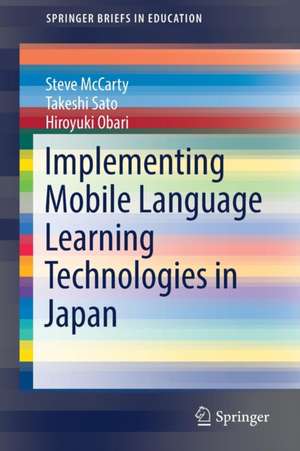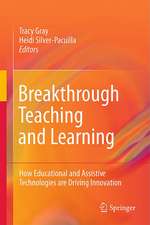Implementing Mobile Language Learning Technologies in Japan: SpringerBriefs in Education
Autor Steve McCarty, Hiroyuki Obari, Takeshi Satoen Limba Engleză Paperback – 13 oct 2016
Din seria SpringerBriefs in Education
-
 Preț: 317.28 lei
Preț: 317.28 lei -
 Preț: 478.71 lei
Preț: 478.71 lei - 20%
 Preț: 387.44 lei
Preț: 387.44 lei - 17%
 Preț: 392.10 lei
Preț: 392.10 lei -
 Preț: 196.30 lei
Preț: 196.30 lei -
 Preț: 394.41 lei
Preț: 394.41 lei -
 Preț: 356.32 lei
Preț: 356.32 lei -
 Preț: 444.52 lei
Preț: 444.52 lei -
 Preț: 196.15 lei
Preț: 196.15 lei -
 Preț: 262.86 lei
Preț: 262.86 lei -
 Preț: 370.61 lei
Preț: 370.61 lei -
 Preț: 376.59 lei
Preț: 376.59 lei -
 Preț: 379.68 lei
Preț: 379.68 lei -
 Preț: 408.44 lei
Preț: 408.44 lei -
 Preț: 376.22 lei
Preț: 376.22 lei -
 Preț: 378.34 lei
Preț: 378.34 lei -
 Preț: 346.59 lei
Preț: 346.59 lei -
 Preț: 377.18 lei
Preț: 377.18 lei -
 Preț: 377.35 lei
Preț: 377.35 lei -
 Preț: 476.03 lei
Preț: 476.03 lei -
 Preț: 376.43 lei
Preț: 376.43 lei -
 Preț: 379.48 lei
Preț: 379.48 lei -
 Preț: 479.29 lei
Preț: 479.29 lei -
 Preț: 340.61 lei
Preț: 340.61 lei -
 Preț: 377.18 lei
Preț: 377.18 lei -
 Preț: 377.57 lei
Preț: 377.57 lei -
 Preț: 376.59 lei
Preț: 376.59 lei -
 Preț: 377.18 lei
Preț: 377.18 lei -
 Preț: 380.84 lei
Preț: 380.84 lei -
 Preț: 379.09 lei
Preț: 379.09 lei -
 Preț: 354.10 lei
Preț: 354.10 lei -
 Preț: 377.95 lei
Preț: 377.95 lei -
 Preț: 379.68 lei
Preț: 379.68 lei -
 Preț: 377.35 lei
Preț: 377.35 lei -
 Preț: 346.59 lei
Preț: 346.59 lei -
 Preț: 444.52 lei
Preț: 444.52 lei -
 Preț: 376.22 lei
Preț: 376.22 lei -
 Preț: 381.21 lei
Preț: 381.21 lei -
 Preț: 348.13 lei
Preț: 348.13 lei -
 Preț: 409.25 lei
Preț: 409.25 lei -
 Preț: 410.17 lei
Preț: 410.17 lei -
 Preț: 377.57 lei
Preț: 377.57 lei -
 Preț: 380.63 lei
Preț: 380.63 lei -
 Preț: 376.59 lei
Preț: 376.59 lei -
 Preț: 377.57 lei
Preț: 377.57 lei -
 Preț: 380.07 lei
Preț: 380.07 lei -
 Preț: 378.54 lei
Preț: 378.54 lei -
 Preț: 379.48 lei
Preț: 379.48 lei -
 Preț: 377.73 lei
Preț: 377.73 lei -
 Preț: 342.74 lei
Preț: 342.74 lei
Preț: 443.75 lei
Nou
Puncte Express: 666
Preț estimativ în valută:
84.94€ • 92.29$ • 71.39£
84.94€ • 92.29$ • 71.39£
Carte tipărită la comandă
Livrare economică 21 aprilie-05 mai
Preluare comenzi: 021 569.72.76
Specificații
ISBN-13: 9789811024498
ISBN-10: 9811024499
Pagini: 117
Ilustrații: X, 97 p. 36 illus.
Dimensiuni: 155 x 235 x 6 mm
Greutate: 0.16 kg
Ediția:1st ed. 2017
Editura: Springer Nature Singapore
Colecția Springer
Seria SpringerBriefs in Education
Locul publicării:Singapore, Singapore
ISBN-10: 9811024499
Pagini: 117
Ilustrații: X, 97 p. 36 illus.
Dimensiuni: 155 x 235 x 6 mm
Greutate: 0.16 kg
Ediția:1st ed. 2017
Editura: Springer Nature Singapore
Colecția Springer
Seria SpringerBriefs in Education
Locul publicării:Singapore, Singapore
Cuprins
Chapter 1 Introduction: Contextualizing Mobile Language Learning in Japan.- Chapter 2 Mobile Language Learning Pedagogy: A Sociocultural Perspective.- Chapter 3 Tokyo University of Agriculture and Technology Case Study: Smartphone App LINE for EFL Peer Learning.- Chapter 4 Osaka Jogakuin University Case Study: Mobilizing the EFL Curriculum and Campus Infrastructure with iPods and iPads.- Chapter 5 Aoyama Gakuin University Case Study: Blended Learning and Flipped Classrooms utilizing Mobile Devices.- Chapter 6 Conclusion: Implementing Language Learning in a Mobile-Oriented Society.
Notă biografică
Steve McCarty was born in Boston and specialized in Japan at the University of Hawaii. He was a regular faculty member and full Professor in Japan from 1985-2015. He currently lectures for Osaka Jogakuin University, Kansai University, KIC Graduate School of IT, and (since 2004) the Japanese government international agency JICA. Since 1998 he has been the elected President of the academic NGO World Association for Online Education.
Dr. Hiroyuki Obari is a Professor at the Aoyama Gakuin University College of Economics, and part-time Lecturer at the Tokyo Institute of Technology graduate school and Waseda University Faculty of Law. He obtained his MA in TESOL from Columbia University and his PhD in Computer Science from the University of Tsukuba. He was a visiting research fellow at the University of Oxford in 1998-1999 and 2007-2008.
Takeshi Sato is an Associate Professor at the Division of Language and Culture Studies, Tokyo University of Agriculture and Technology. He holds MA degrees in TESOL from Keio University and the Institute of Education (London). His academic interests include L2 vocabulary acquisition, computer & mobile-assisted language learning, and English as a Lingua Franca pedagogy. He has published articles in TESOL Quarterly, ReCALL, Asian EFL Journal, etc.
Textul de pe ultima copertă
This book explores theoretical and practical aspects of implementing mobile language learning in university classrooms for English as a Foreign Language in Japan. The technologies utilized, such as smartphones, iPads, and wi-fi, integrate students’ hand-held devices into the campus network infrastructure. The pedagogical aims of ubiquitous mobile learning further incorporate social media, blended learning, and flipped classroom approaches into the curriculum. Chapter 1 defines mobile language learning within dimensions of e-learning and technology-assisted language learning, prior to tracing the development of mobile learning in Japan. Chapter 2 documents the sociocultural theory underpinning the authors’ humanistic approach to implementation of mobile technologies. The sociocultural pedagogy represents a global consensus of leading educators that also recognizes the agency of Asian learners and brings out their capability forautonomous learning. Case studies of universities, large and small, public and private, are organized similarly in Chapters 3 to 5. Institutional/pedagogical and technological context sections are followed by detailed content on the implementation of initiatives, assessment of effectiveness, and recommendations for other institutions. Distinct from a collection of papers, this monograph tells a story in brief book length about theorizing and realizing mobile language learning, describing pioneering and original initiatives of importance to practitioners in other educational contexts.
Caracteristici
ies at various universities all include recommendations for other institutions on using state-of-the-art technologies in actual classes Introduces the history of Mobile-Assisted Language Learning (MALL) in Japan to the international community of scholars As Japan was a pioneer of mobile Internet technologies, some of the world’s first applications of mobile devices to education are described Covers both theoretical aspects and the practical implementation of ubiquitous language learning technologies, including smartphones, iPads, podcasting, social media, blended learning, and flipped classroom approaches Documents case studies implementing emerging technologies in university classrooms and the curriculum for English as a Foreign Language Includes supplementary material: sn.pub/extras


